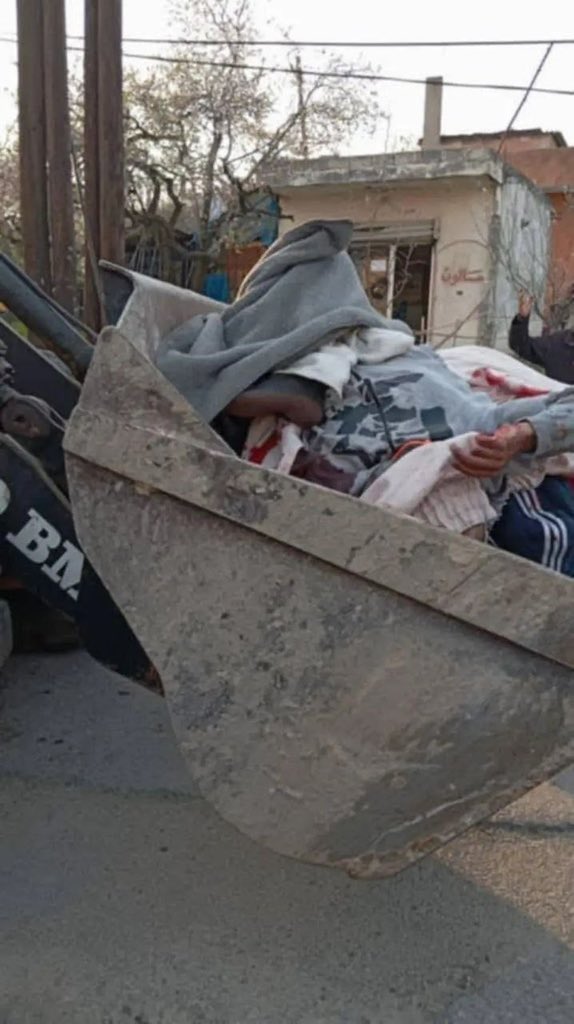Secretary of State Marco Rubio’s recent warning that Syria may be on the verge of another “full scale civil war” seems increasingly more possible, with sectarian tensions erupting on multiple fronts, as the Islamist Hayat Tahrir al-Sham (HTS) government’s promise of religious unity seems to be in stark contrast to the reality on the ground.
In March we saw massacres begin in the northwest governorates of Latakia and Tartus, where Islamist groups, along with government forces, systematically targeted Alawites. Well over 1,300 Alawites were dragged from their homes and executed, and the killings have continued for months.
Further tensions are rising in Tartus toward the Maronite Christian community as well, with posters being hung on churches demanding that the Christians either convert to Islam or pay the jizya, a religious tax.

HTS bulldozers reported to be collecting the bodies of slain Alawites in the northwest (image from X)
Syria doesn’t actually have a jizya in place in the modern age. The practice, described in the Quran, is for a Muslim state to charge dhimmis, or non-Muslims, a separate tax for protraction. Though seen as an incentive to convert by some, historically some Muslim rulers became so dependent on the revenue that they actively prevented people from converting so they’d still have to pay the jizya.
The jizya stopped being enforced or collected in Muslim countries generally in the 19th century. Some Islamist factions like ISIS or the Tehreek-e Taliban Pakistan (TTP) in Pakistan’s tribal areas will attempt to use jizya as a rationale to extort non-Muslims in territory they control.
As mentioned, Syria does not have a jizya, and the HTS not only made no effort to impose one after seizing power last year, they have insisted Sharia law would not be imposed in the country, suggesting it’s not an active topic of discussion for them.
The hostility toward the Christian community in the northwest is in part a continuation of the hostility toward the Alawites. Indeed, while Alawites are Muslims their rituals have some commonality with Christianity, which has led to them being labeled as Christians by some Islamist factions.
The Alawites are a target chiefly because former President Assad was an Alawite, and there is a perception among Islamists that any Alawite was necessarily in league with him. In practice a lot of Alawites argue they weren’t treated very well by Assad either.
The interest in sectarian violence as revenge for Assad-era injustices doesn’t end with the Alawites, either. In Damascus, many of the Shi’ite Muslims are reporting feeling fear about being persecuted by the Sunni Islamists. There too, people are citing Assad’s alliance with Iran, a Shi’ite nation, as leading to the perception that Syrian Shi’ites were in on it too.
Thousands of Alawites have fled Syria into Lebanon. Many are reportedly sheltering in a half-constructed mosque surrounded by graveyards. Though the HTS declared the violence over, killings still continue regularly.
Some Alawites had reportedly taken shelter in the Hmeimim Air Base in Latakia Governorate, and that base has come under repeated attack recently. There were reports of two Russian soldiers stationed at the base being killed in fighting, though exactly who is attacking remains unclear.
The violence isn’t confined to the northwest either, in the south of the country, in the Druze-heavy Suwayda Governorate, the governor was actually captured and held hostage by an armed group demanding he release one of the prisoners held in jail there.
The governor was eventually released, but he and a number of personnel were held, and only let go after other officials promised to release the prisoner, who was held for stealing cars. Sectarian tensions surrounding the Druze have also led to violence repeatedly, and the Druze-dominated regional government is struggling to maintain order on multiple fronts.
Israel has promised to “protect the Druze,” but in practice this has just meant expanding their invasion and occupation of the southwest of Syria. Here too though, the HTS government’s promise of unity never materialized, and many Druze feel like they’re on the outside looking in.


